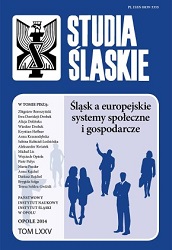Jan Wyglenda i jego rodzina wśród meandrów historii politycznej Górnego Śląska XX wieku
Jan Wyglenda and his family among the windings of history
Author(s): Zbigniew BereszyńskiSubject(s): History
Published by: Instytut Śląski
Keywords: Jan Wyglenda; Upper Silesia in 20th century; political biography;
Summary/Abstract: The history of Jan Wyglenda and his relatives is an illustration of complicated and often dramatic lots of Upper Silesia in the 20th century. Their life experiences show how hard was to many Silesians of Polish national orientation to find the right place in social life. Between 1919 and 1921 Wyglenda belonged to leading organizers of Polish military conspiracy in Upper Silesia. He held important leading and staff functions during three Silesian Uprisings. Between 1921 and 1924 he was the leader of Silesian Rebels So- ciety. Since 1927 he had been strictly connected with Silesian voivode Michał Grażyński and held essential public functions in Lubliniec and Rybnik, and after that, he became an administrative head of Książęce Pszczyńskie Mines. Many important public functions had also been held by his brother-in-law Fryderyk Antes, mayor of Tarnowskie Góry, prefect of Rybnik. Karol Grzesik, marshal of Silesian parliament, also belonged to the family. After the start of World War II, Wyglenda and Antes went to France, and next to Great Britain. Both of them were in Polish Military Forces of the West. Because of his relationships with Piłsudski’s camp, Wyglenda had been under repression of staff of general Władysław Sikorski and had spent long time in special isolated camp. Karol Grzesik was lost in September 1939 (probably murdered by NKVD = People’s Commissariat for Internal Affairs). After war, Wyglenda and Antes returned to the country. Both of them have been under repression of the communist authorities and have spent many years in prison. Ewa Krystyna, daughter of Jan, born in 1939, had been a head of Silesian Institute’s in Opole library. What is more, she supported the Solidarity movement founded in 1980
Journal: Studia Śląskie
- Issue Year: 2014
- Issue No: 75
- Page Range: 133-167
- Page Count: 35
- Language: Polish

